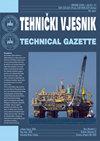H-infinity Variable-Pitch Control for Wind Turbines Based on Takagi-Sugeno Fuzzy Theory
IF 1.4
4区 工程技术
Q3 ENGINEERING, MULTIDISCIPLINARY
引用次数: 0
Abstract
: When the wind speed is above the rated value, the output power of the wind turbine should be maintained at the rated value in order to prevent the power generation system from overheating. In addition, the natural wind speed will fluctuate randomly in a large range of values, making the traditional control effect not ideal. This paper presents a novel H-infinity (H ∞ ) pitch control strategy for Wind Turbine Generators (WTGs), which can make the rotor speed and output power constant when the wind speed changes in a large range. In order to shorten response time and reduce overshoot, in the specific solution, the control method combines the H ∞ theory and the Takagi-Sugeno (T-S) fuzzy theory. Firstly, the linearized models of several operating points were obtained with the T-S fuzzy theory. Then, a robust controller was designed for each linear sub-system based on the H ∞ control theory. Furthermore, the controllers of the sub-systems were superimposed into a global controller for the entire system through the membership function. Finally, modeling and simulation were carried out in MATLAB/SIMULINK. The simulation results show that when the wind speed changes above the rated speed, the rotor speed can be maintained at the rated value, and the output power also can be maintained at the rated value. Compared with the optimal control, the response speed of this method is faster and the overshoot is smaller. It provides a new idea for the pitch angle control of wind turbine.基于Takagi-Sugeno模糊理论的风力机h∞变螺距控制
:当风速高于额定值时,风力机的输出功率应保持在额定值,以防止发电系统过热。此外,自然风速会在大范围内随机波动,使得传统的控制效果不理想。提出了一种新的风力发电机H∞(H∞)螺距控制策略,该策略可以在风速大范围变化时使转子转速和输出功率保持恒定。为了缩短响应时间和减少超调,在具体解中,控制方法结合了H∞理论和Takagi-Sugeno (T-S)模糊理论。首先,利用T-S模糊理论建立了多个工作点的线性化模型;然后,基于H∞控制理论设计了各线性子系统的鲁棒控制器。通过隶属度函数将各子系统的控制器叠加为整个系统的全局控制器。最后在MATLAB/SIMULINK中进行建模和仿真。仿真结果表明,当风速在额定转速以上变化时,转子转速能保持在额定值,输出功率也能保持在额定值。与最优控制相比,该方法的响应速度更快,超调量更小。为风力机的俯仰角控制提供了新的思路。
本文章由计算机程序翻译,如有差异,请以英文原文为准。
求助全文
约1分钟内获得全文
求助全文
来源期刊

Tehnicki Vjesnik-Technical Gazette
ENGINEERING, MULTIDISCIPLINARY-
CiteScore
1.90
自引率
11.10%
发文量
270
审稿时长
12.6 months
期刊介绍:
The journal TEHNIČKI VJESNIK - TECHNICAL GAZETTE publishes scientific and professional papers in the area of technical sciences (mostly from mechanical, electrical and civil engineering, and also from their boundary areas).
All articles have undergone peer review and upon acceptance are permanently free of all restrictions on access, for everyone to read and download.
For all articles authors will be asked to pay a publication fee prior to the article appearing in the journal. However, this fee only to be paid after the article has been positively reviewed and accepted for publishing. All details can be seen at http://www.tehnicki-vjesnik.com/web/public/page
First year of publication: 1994
Frequency (annually): 6
 求助内容:
求助内容: 应助结果提醒方式:
应助结果提醒方式:


